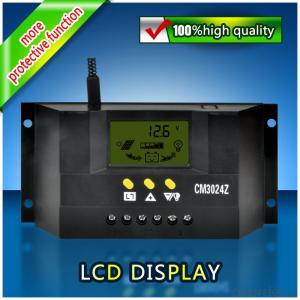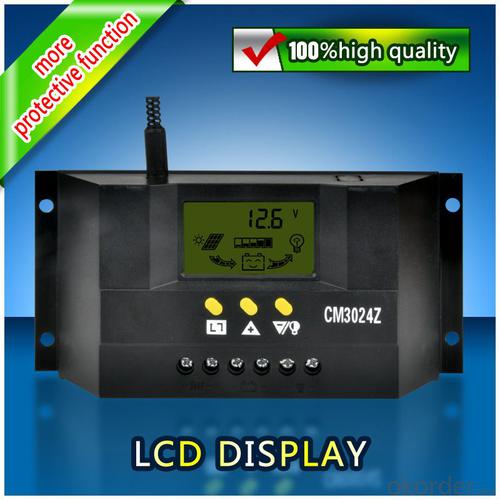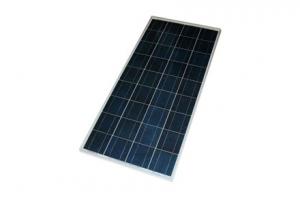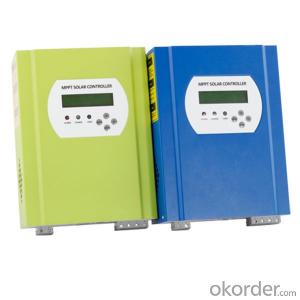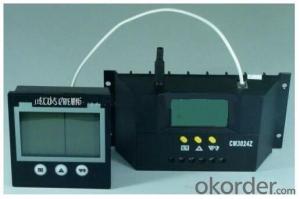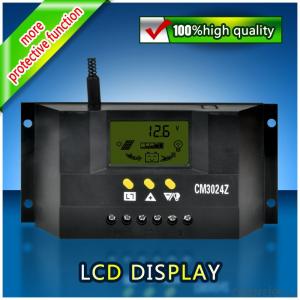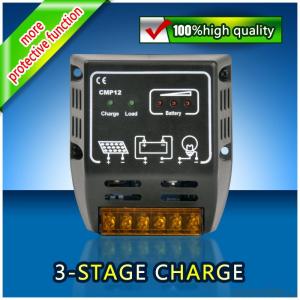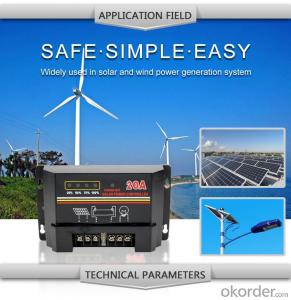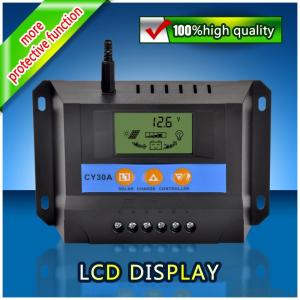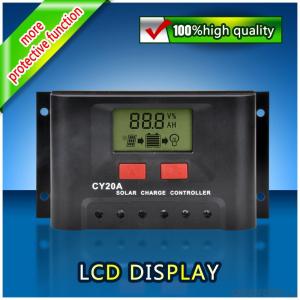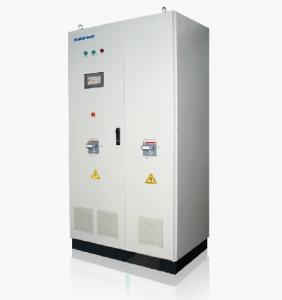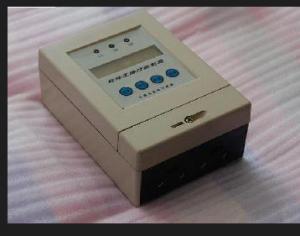Solar LCD Controller CM3024Z with best price
- Loading Port:
- China main port
- Payment Terms:
- TT or LC
- Min Order Qty:
- 1 unit
- Supply Capability:
- 10000 unit/month
OKorder Service Pledge
OKorder Financial Service
You Might Also Like
Product Introduction
Solar controller is control device which can control solar panel and transform solar energy into electricity then store to the battery bank. Solar controller is the most important part in offgrid system, whose performance has much effect on life expectancy and operation of the whole system, especially the battery expectancy.
Application Areas
Standalone Photovoltaic power station
Standalone Domestic household photovoltaic power system
Mobil communication base stations, expressway and other non-residential regions.
Coastal islands, remote mountainous, border posts for regions shortage of or without electricity.
Government demonstration projects, landscape lighting project etc.
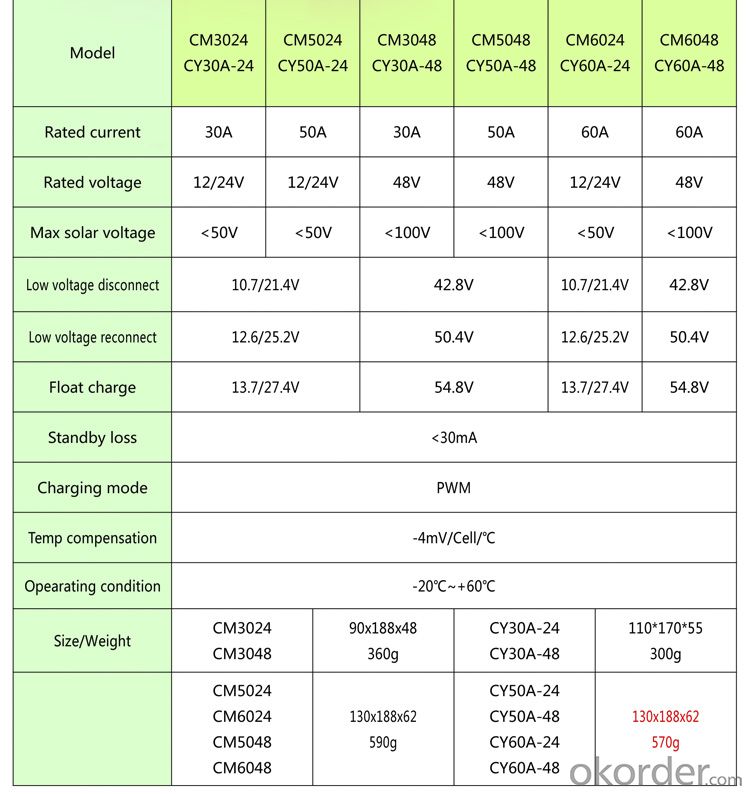
Selection of high-quality materials properties be consistent from beginning to end
For life is a convenient
A little more secure
The innovation design idea of the perfect show
The first set of people-oriented
The high-end configuration components
- Q: Can a solar controller be used with a solar-powered agricultural farm?
- Yes, a solar controller can be used with a solar-powered agricultural farm. A solar controller is designed to regulate and optimize the charging and discharging of batteries in a solar power system. It helps manage the flow of electricity from the solar panels to the batteries and other devices, ensuring efficient utilization of the solar energy. In an agricultural farm powered by solar energy, a solar controller can help monitor and control the charging process of batteries used to store excess energy for later use, providing a reliable and sustainable power supply for various agricultural operations.
- Q: Can a solar controller be used with a solar-powered warehouse or distribution center?
- Yes, a solar controller can definitely be used with a solar-powered warehouse or distribution center. A solar controller, also known as a charge controller, is an essential component in a solar power system that regulates the flow of electricity from the solar panels to the battery bank. By ensuring that the batteries are charged efficiently and preventing overcharging or damage, a solar controller helps optimize the performance and longevity of the solar power system in a warehouse or distribution center.
- Q: What is the operating temperature range of a solar controller?
- The operating temperature range of a solar controller typically falls between -40 degrees Celsius to 85 degrees Celsius.
- Q: Can a solar controller be used in a solar-powered electric car racing system?
- Yes, a solar controller can be used in a solar-powered electric car racing system. A solar controller regulates the charging and discharging of batteries in a solar power system. In a solar-powered electric car racing system, the solar controller would effectively manage the flow of power from the solar panels to the batteries, ensuring efficient energy storage and utilization for the car's performance.
- Q: Can a solar controller be used with solar-powered indoor waste management facilities?
- Yes, a solar controller can be used with solar-powered indoor waste management facilities. A solar controller is designed to regulate and optimize the charging and discharging of batteries in a solar power system. In an indoor waste management facility powered by solar energy, the solar controller can efficiently manage the charging of batteries using solar panels, ensuring a continuous and reliable power supply for waste management operations.
- Q: How does a solar controller handle battery equalization or balancing?
- A solar controller plays a crucial role in managing battery equalization or balancing in a solar power system. Battery equalization refers to the process of maintaining the voltage and capacity balance between individual cells or batteries within a battery bank. This process is necessary to ensure optimal performance, longevity, and the prevention of premature battery failure. Solar controllers typically feature a built-in equalization charging mode or function. This mode is designed to periodically deliver a higher voltage charge to the battery bank, usually around 15-16 volts, which is higher than the standard charging voltage of around 13.8-14.4 volts. This elevated voltage helps to break down any sulfation or stratification that may have occurred within the battery cells. During the equalization charging process, the solar controller closely monitors the battery bank's voltage and current levels. It ensures that the charging voltage remains within safe limits and that the battery bank does not overcharge or exceed its capacity. Once the equalization charging cycle is complete, the solar controller will automatically switch back to the regular charging mode, maintaining a lower voltage to sustain the battery bank's charge. Additionally, some advanced solar controllers employ intelligent charging algorithms and advanced microprocessor technology to further enhance battery equalization. These controllers can analyze and adjust the charging voltage based on the battery bank's condition and requirements. They may also incorporate features like temperature compensation to ensure accurate charging voltage in different environmental conditions. In summary, a solar controller handles battery equalization or balancing by providing a dedicated equalization charging mode that delivers a higher voltage charge to the battery bank. It monitors the battery bank's voltage and current levels to prevent overcharging or exceeding the battery's capacity. Advanced solar controllers may employ intelligent algorithms and temperature compensation to optimize battery equalization and overall system performance.
- Q: How does a solar controller handle fluctuating solar panel output?
- A solar controller handles fluctuating solar panel output by regulating the amount of energy flowing from the panels to the battery or load. It constantly monitors the voltage and current from the panels and adjusts the charging or discharging process accordingly to maintain a stable and optimal power flow. This ensures that the battery is charged efficiently without overcharging or damaging it, even when the solar panel output varies due to factors like weather conditions or shading.
- Q: Can a solar controller be used with a grid-tied solar system?
- No, a solar controller is not typically used with a grid-tied solar system. Grid-tied systems are designed to directly connect to the electrical grid, allowing excess energy to be fed back into the grid. Solar controllers, on the other hand, are commonly used in off-grid systems to regulate and optimize the charging of batteries.
- Q: What is the role of a solar controller in preventing electrical surges in the solar panel system?
- The role of a solar controller in preventing electrical surges in the solar panel system is to regulate and control the flow of electricity between the solar panels and the batteries or the grid. It ensures that the voltage and current levels are kept within safe limits, preventing any sudden spikes or surges that may damage the system components. The solar controller also provides protection against overcharging or over-discharging of batteries, safeguarding the overall system from potential electrical surges.
- Q: Can a solar controller be used with a solar water heating system?
- Yes, a solar controller can be used with a solar water heating system. A solar controller is designed to regulate and optimize the operation of solar panels, which generate electricity from sunlight. While a solar water heating system uses solar panels to heat water directly, the controller can still be used to monitor and control the temperature and flow of water, maximizing the efficiency of the system.
Send your message to us
Solar LCD Controller CM3024Z with best price
- Loading Port:
- China main port
- Payment Terms:
- TT or LC
- Min Order Qty:
- 1 unit
- Supply Capability:
- 10000 unit/month
OKorder Service Pledge
OKorder Financial Service
Similar products
Hot products
Hot Searches
Related keywords
